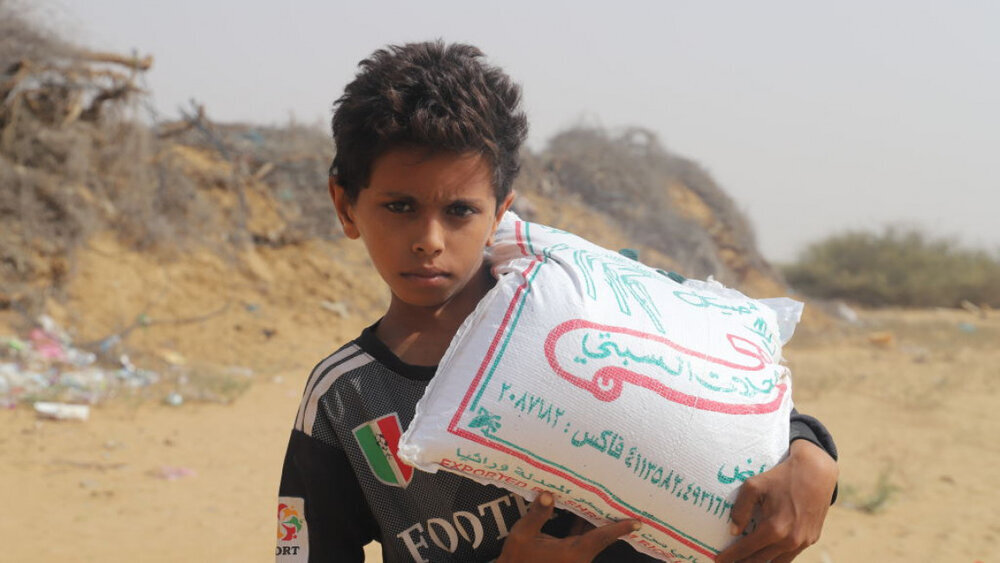Lifting Yemen’s blockade vital for peace, humanitarian relief: Iran’s envoy

TEHRAN – Iran’s Ambassador to Yemen, Ali Mohammad Rezaei, has highlighted the dire humanitarian crisis in Yemen, calling for an immediate end to the blockade and urgent steps toward reconstruction.
“We emphasize the need for a complete lifting of the siege on Yemen and the commencement of rebuilding efforts. Supporting affected civilians and restoring war-ravaged areas is crucial to establishing long-term stability and security, as well as fulfilling the aspirations of the Yemeni people,” he said, speaking on the occasion of the celebration of the 46th anniversary of the victory of the Islamic Revolution of Iran.
The blockade in Yemen has been a critical aspect of the ongoing war against the country since 2016. It was imposed by the Saudi-led coalition in an effort to cut off supplies to the Ansarullah Resistance group. This blockade has severely affected the humanitarian situation, restricting the flow of essential goods, including food, fuel, and medical supplies, and exacerbating the suffering of civilians.
The blockade has been widely criticized by international organizations for its devastating impact on Yemen's population, leading to one of the world’s worst humanitarian crises.
Elsewhere in his remarks, Rezaei underscored that Tehran has consistently supported peace while actively combating extremist groups.
Referring to Iran’s foreign policy principles, the ambassador stated, “Iran has always prioritized its relations with neighboring countries and remains firmly committed to a policy of non-aggression toward regional states.”
Rezaei reaffirmed Iran’s longstanding opposition to the presence of foreign military forces in the region, stressing that external interventions only serve to destabilize the situation further.
Iran denounces US accusations on supplying arms to Yemen
In a separate development, Iran’s Permanent Mission to the United Nations strongly dismissed recent U.S. allegations that Tehran is supplying arms and financial support to Yemeni Resistance forces.
In a letter sent to the UN Secretary-General and the president of the Security Council on Thursday, the Iranian mission described the accusations as “baseless” and a diversion from Washington’s own role in fueling regional conflicts.
The mission accused the United States of attempting to obscure its complicity in Israeli military actions by falsely attributing regional tensions to Iran. “Unlike the United States, which continues to provide extensive military and financial support to the Israeli regime for its aggression against the oppressed people of the region, the Islamic Republic of Iran remains committed to the principles of international law, the UN Charter, and Security Council resolutions,” the statement read.
Tehran has maintained a “unified and stable” approach to the Yemen conflict, insisting that a sustainable resolution can only be achieved through a “comprehensive political process” that ensures Yemen’s independence, sovereignty, and territorial integrity.
The statement also condemned recent military actions by the United States, the United Kingdom, and Israel in Yemen, denouncing them as violations of the country’s sovereignty and breaches of international law.
These attacks, Iran’s mission noted, are direct retaliation against Yemen’s pro-Palestinian solidarity campaign. Yemeni forces have been targeting ships linked to Israel in key maritime zones, including the Red Sea, the Bab el-Mandeb Strait, the Gulf of Aden, and the Arabian Sea. Additionally, they have launched strikes against Israeli positions in the occupied territories.
Iran has consistently advocated for a diplomatic resolution to the Yemen crisis, calling for an immediate end to hostilities, a nationwide ceasefire, and meaningful dialogue among Yemeni factions. The mission reiterated that “lasting peace in Yemen can only be achieved through diplomacy, respect for national sovereignty, and adherence to international law—not through military interventions or baseless accusations.”
Speaking at a Security Council briefing on Yemen, US Deputy Representative to the UN Dorothy Shea alleged that Iran’s material and financial assistance had enabled Yemen’s Ansarullah Resistance fighters to “launch numerous attacks on civilian infrastructure” and target American warships. Tehran, however, dismissed these claims as part of Washington’s broader strategy to shift blame for escalating conflicts in the region.
Iran maintains that the future of Yemen must be determined solely by its people, without foreign interference.
